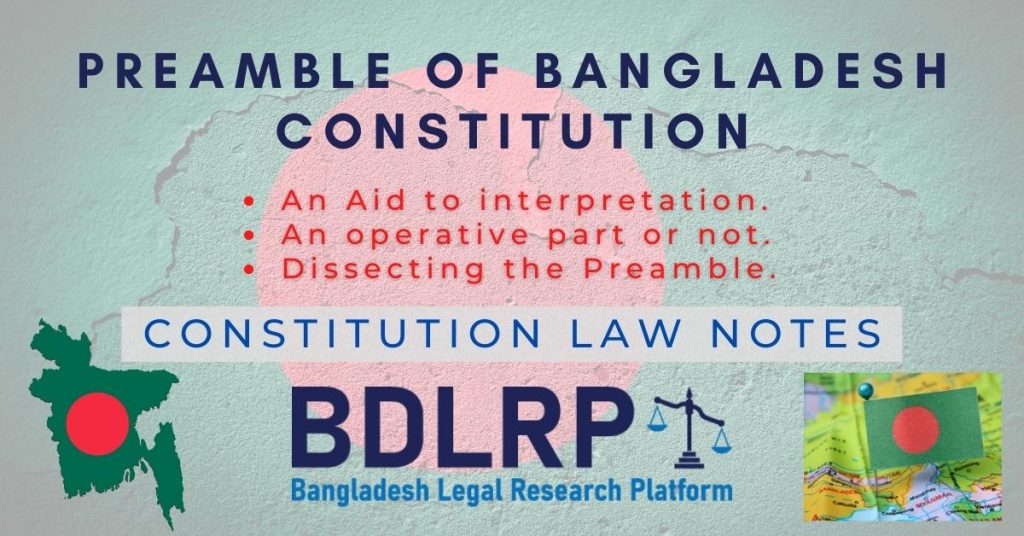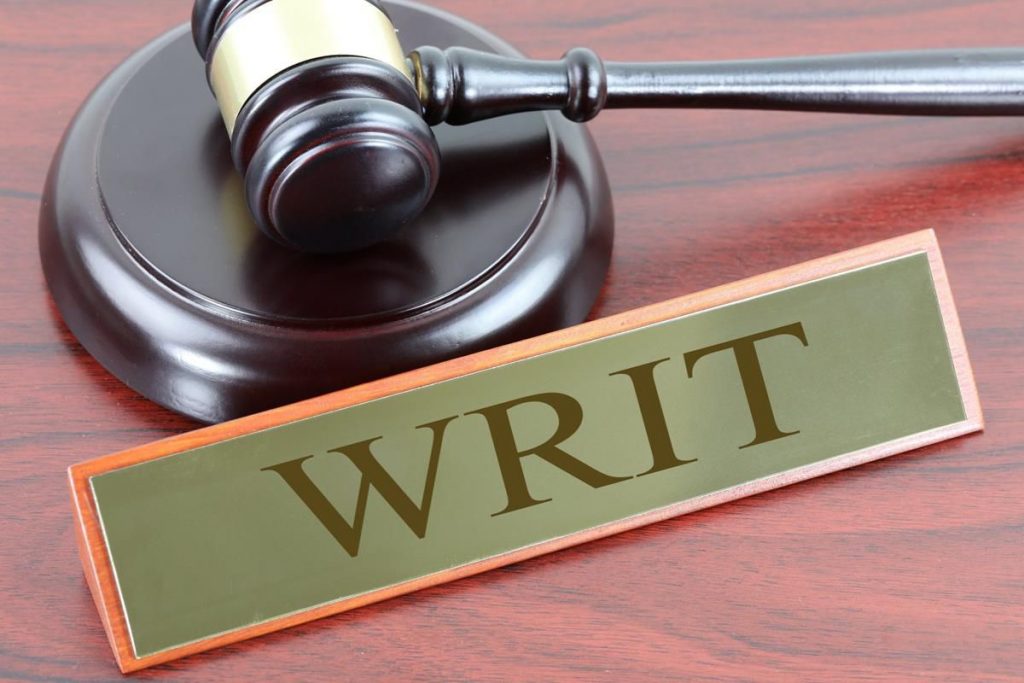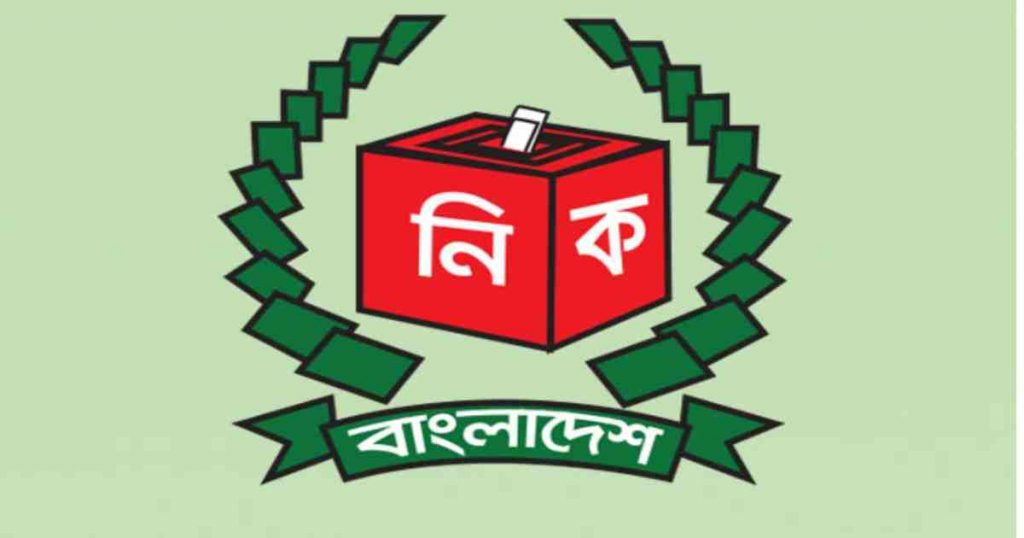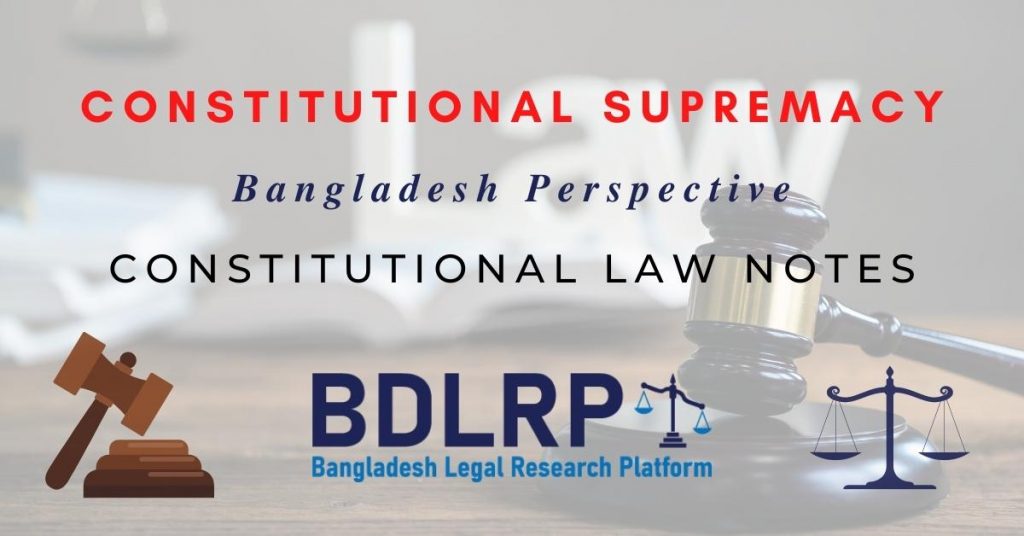INTRODUCTION:
Preamble is the introductory part or paragraph in a statute setting forth its intention and backgrounds. The US adopted their constitution in 1787, and for the first time contained a Preamble and after that most of the countries with written constitution are adopting Preamble to their constitution. The preamble of our constitution is the soul of our constitution. The whole constitution depends on the preamble and works as a description of it. The Preamble of the original Constitution of 1972 was amended by the Martial Law Administrator and then validated by the 5th Amendment of the Constitution in 1979.
“The Preamble to an act contains in a nutshell its ideals and inspiration”, said by Chief justice Subba Rao in Golaknath V. State of Punjab, AIR 1967 SC 143.
In Kesavananda Bharati vs State of Kerala AIR 1973, 4 SCC 225, Chief Justice Sikri said that, “Preamble is the key to intention of the maker of the act”.
The Preamble to the constitution serves the following THREE main purposes:
- It indicates the source of the constitution i.e., the legal and moral basis of the constitution.
- It expresses in a nutshell, the ideas and aspirations of the objective of the constitution.
- It has a great importance, as a guide, to interpretations of the constitution Preamble indicates the origin scope and purpose of a constitution.
Preamble as an aid to interpretation:
“Preamble has great role to play in interpreting the Constitution. If any provision is capable of having two or more meanings, then the meaning conforming to the preamble is preferable”, Powell v Kempton Park Race Course 1899 AC 143.
Again in the case Anwar Hossain Chowdhury v. Bangladesh 1989 B.L.D. (SPL) 1, 41 D.L.R. (AD) 165 (1989), it was argued that however clear a provision of the Constitution may be, if it is found that plain meaning of the provision runs counter to the spirit and objectives of Constitution as stated in the Preamble, the question should immediately be asked whether the framers of the Constitution intended to bring about the result which the literal construction produces and the court should search for a meaning in conformity with spirit and objectives of the Constitution as indicated in the preamble.
In the case of Kudrat-E-Elahi V. Panir and others versus Bangladesh, 44 DLR AD 319, it was said that Preamble comes to aid, only when, the substantive provisions of the constitution are challenged.
Is a Preamble an operative part?
View 1: Not totally an operative Part
Preamble is not generally considered to be an operative part of the constitution. it is not considered enforceable by Court, unlike any substantive provision in the constitution. It is not an integral part of the Constitution, because:
- If it is excluded from the constitution, no harm will result in the constitutional fabric.
- It is not always compulsory to have a Preamble. Example: The Government of India Act 1935 had no preamble.
- In Berubaris Case AIR 1960 SC 845, It is said that the Preamble is neither a source of power, nor a limitation on the elected provisions of a constitution.
“Preamble has never been regarded as the source of any substantive power conferred on the government of the USA or any of its departments”, Jacobson V. Massachusetts (1960) 197 US 11.
“Where the language or provisions of the operative part are clear, full effect should be given to the operative part, even though those provisions appear to conradict the terms of the preamble”, Berubaris Case AIR 1960 SC 845
In Powell V. Kempton Park Race Course company, 1899 AC 143, Lord Halsbury said, TWO prepositions are quite clear:
- A Preamble may afford, useful light, as to what the statutes intended to reach.
- If an enactment is in itself clear an unambiguous, no Preamble can qualify or cut down the enactment.
View 2: Totally an operative part, and also it can’t be amended like a general provision, rather, it has to be amended like the way articles in our constitution is amended.
In India, it wasn’t an operative part of the constitution. But in recent times, the view’s changed. In the case of Kesavananda Bharati vs State of Kerala, AIR 1973 4 SCC 225, for the first time the Indian Supreme Court held that Preamble is an operative part of the constitution.
But in BD, According to Professor Dr Muhammad Ekramul Haque Sir, it was always was an operative part. The reason is proved by these three points:
- No contrary indication, old article 142 the constitution of Bangladesh, new article 7B.
- The history of the passing of this Constitution.
- Judicial reviews (Anawar Hossain Case).
1. No contrary indication old article 142 the constitution of Bangladesh, new article 7B:
It is nowhere written in the constitution that it is not a part of the constitution. In old article 142 of the constitution of Bangladesh, it stated that preamble can’t be amended without referendum. In the recent, Article 7B of the constitution of Bangladesh clearly states that some provisions aren’t amendable (without referendum) and preamble is one of them.
2. The history of the passing of this Constitution:
Our constitution was passed in the Constituent Assembly and it was dismissed with the passing of the constitution. The Constituent Assembly approved the constitution, as well as the preamble in that assembly and the preamble, articles and the schedules are given the same priority. Affirming that, preamble is indeed an operative part of constitution as any other articles in the constitution.
3. Judicial reviews:
Our constitution is an operative part is mentioned in the prominent case of Anwar Hossain Chowdhury v. Bangladesh 1989 B.L.D. (SPL) 1, 41 D.L.R. (AD) 165 (1989) (The 8th Amendment Case). It’s the first judgment where the Supreme Court of Bangladesh stroke down an amendment to the constitution made by the parliament. By two Writ petition, the amended Article 100 & the notification of the Chief Justice was challenged as ultra vires. A division bench of the HCD dismissed the petition summarily. Leave was granted by the Appellate Division by a majority of 3 to 1 striking down the 8th amendment.
The principal argument of the judgment is that, ‘The constitution stands on certain fundamental principles which are its structural pillars, which the parliament cannot amend by its amending power. Because if these pillars are dismissed or damaged, then the whole constitutional structure will be down’. Furthermore, the court said ‘If any provision can be called the ‘pole star’ (a directing principle or guide) of the constitution, then it’s Preamble.
The preamble is not only a part of the constitution; it now stands an entrenched , that cannot be amended by the parliament. And this amendment simply destroys the objectives of rule of law, which is enunciated in our preamble.
Thus, preamble of Bangladesh Constitution has been recognized as the basic structure of Bangladesh constitution by Bangladesh Supreme Court being the guardian of it. So, it is a part of the constitution, an operative part of the constitution and most importantly, a judicially enforceable part of the constitution. It was also held by the Supreme Court that; the Preamble is an operative part of our constitution and can’t be amended without a referendum.
Dissecting the Preamble:
First Paragraph: It identifies the legal basis of the Constitution. Its first line ‘We the people of Bangladesh, having proclaimed our independence’ and the last paragraph ‘In our Constituent Assembly’ established all the power of the country belongs to the people of Bangladesh (article-7). The members of the Constituent Assembly were all people’s representatives. The preamble, therefore, indicates that the legal basis of our Constitution, which is the people, the ultimate source of all power. It indicates that, people are the real maker of the constitution.
This para states the terms ‘Liberation’ and ‘Independence’. Liberation signifies the vision for economic democracy, which Independence doesn’t. Independence is equal to sovereignty, meaning freedom from external interference. Liberation is not just freedom from foreign dominance. It means freedom from exploitation, poverty and hunger. The sentence ‘Historic struggle for national liberation’, was amended in the 15th amendment. War was changed with the word Struggle, to indicate that war of 1971 wasn’t just a mere rebellion or just for mere freedom. But for a total emancipation of the people from oppression.
Now a question may arise, is the struggle continuing after liberation? We can see that in the case of Registrar, University of Dhaka V. Dr Sajjad Hossain (34 DLR (AD) 1) B.H. Chowdhury J. argued that the struggle continues towards the realization of a socialist society. Because fundamental aim of the state is to raise a society, in which the rule of law, fundamental human rights and freedom, equality and justice will be ensured.
Second Paragraph: The second paragraph identifies the moral basis of the constitution. The constitution is the
refection of the aspirations of the people of Bangladesh, so, it is also the duty of this very people to obey it. It established four fundamental principles of the state, as a pillar of our state. Namely: Nationalism, Socialism, Democracy and Secularism. These pillars uphold all of our constitution. Again, as the supreme law of the land, the constitution is the basis of law and order in the country. If it is violated, then the whole governmental order will be collapsed. It is, therefore, the moral duty of the people to obey this constitution. This part was heavily changed with the 15th amendment.
Third Paragraph: The third paragraph identifies the goal of the state. It draws the spirit of the second paragraph and confirms of its application by mentioning democratic process, rule of law, fundamental human rights and freedom etc and that, these would be the fundamental aim of the country. This para states the term ‘Rule of Law’, ‘Fundamental Rights’, ‘Political, Economic and Social Equality’. Let’s briefly discuss and comment on these, as how well they are maintained:
Rule of Law: It means that, law is supreme and a government in power must act according to law and that by implication, it gives every citizen remedy if their rights are infringed. The provisions of the original Constitution of 1972 were more or less conducive enough to ensure rule of law in Bangladesh. But in 1975, by the 4th Amendment multi-party democratic system was buried and one party dictatorial presidential system was introduced. In 1991, the 12th Amendment of the Constitution was passed reverting the governmental system from presidential to parliamentary. But rule of law still remains a far cry, because provisions like emergency, preventive detention, ordinance-making power of the president, involvement of the executive in the judiciary, Article 70, CAG’s dependence upon the executive etc. still stands.
Fundamental Rights: The Constitution provides for eighteen fundamental rights. But due to poverty and the absence of any legal aid, most of the poor people cannot enjoy their rights and also preventive detention (A system, in which the citizens of a country can be arrested without being told the grounds for the arrest), emergency provisions etc. act as a threat towards the enjoyment of fundamental rights. Political, Economic and Social Equality: Not only in the preamble but in PART II, a large number of social and economic rights have got their recognition. Since Bangladesh achieved independence, economic inequality rather than equality is reigning the majority life of the people. There is no control on the high
growth rate of population and the rate of literate people is going down. There will be no political equality unless and until the people are educated and politically conscious.
Fourth Paragraph: The supremacy of the constitution and its protection by the people is confirmed by the fourth paragraph, and also mentioned latter in article 7. It also said that, our foreign policy would be international peace and co-operation in keeping with the progressive aspiration and mankind.
Reference: The Constitutional Law of Bangladesh by M. Jahim Ali Chowdhury. Constitution, Constitutional law And Politics: Bangladesh Perspective.
Prepared By-
- Sojib Wayajed Joy
- Rafid Mahmud
- Idris Khan
- Md Imram
- Bijoy Kanti Dey
Department of Law (Session: 2020-21), Comilla University.
BDLRP Team of Comilla University.





Comments are closed.